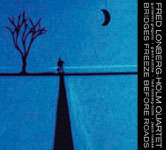|
|
 |
Dusted Reviews
Artist: Fred Lonberg-Holm Quartet Album: Bridges Freeze Before Roads Label: Longbox Recordings Review date: Mar. 19, 2006 |

|
|
|
 |
Bridges Freeze Before Roads was recorded in March 2001, and the time that passed between the original session and this disc’s release was a busy one for its participants. Cellist Fred Lonberg-Holm has been involved in his customary bevy of activities, Glenn Kotche is now the drummer for Wilco, bassist Jason Roebke has released two discs under his own name, as well as playing with some of Chicago’s best, and clarinetist Guillermo Gregorio continues, most recently with his Madi Ensemble, to explore new ground. Roebke, Kotche and Lonberg-Holm, however, continue to collaborate in a trio led by the latter, and a recent performance by the quartet to celebrate this album’s release found them in much the same improvisational space, despite the intervening years.
Though the quartet carries his name, Lonberg-Holm, both on-stage and on disc, doesn’t seem to carry any distinct air of leadership, and while the group engage in some fairly jagged and convoluted conversations, Bridges Freeze Before Roads isn’t the free for all that could’ve resulted. That fact is due in part to the quartet’s staid, even polite, interactions. For much of the recording, the participants give each other plenty of room, as if they are trying to clear away clutter and hone in on a pristine sound. But, more often than not, when two of the musicians play in unison, or lock into a specific mode, there always lurks someone in the background, moving on a different plane, outside the conversation. In the case of Kotche’s percussion, this background playing is both figurative and literal, since his contributions are obscured by those of the men around him, and when the music becomes even slightly crowded, especially when Roebke and Lonberg-Holm are mining their strings’ percussive qualities, Kotche is easily lost in the mix.
Bridges Freeze Before Roads isn’t without a lyrical and melancholy beauty, but, as it so often happens in life, the existence of such beauty can be easily missed. The more detailed and textural playing here hits on such moments seemingly coincidentally -- the occurrence of four paths, never seeming to fully run in unison, crossing in twos or threes -- though, considering the pedigree involved, it's more likely they know what they're doing. Like one driving lost on an unfamiliar road, listeners must be on the lookout for such crossroads, for they arise without warning, and can be easily missed.
By Adam Strohm
|







